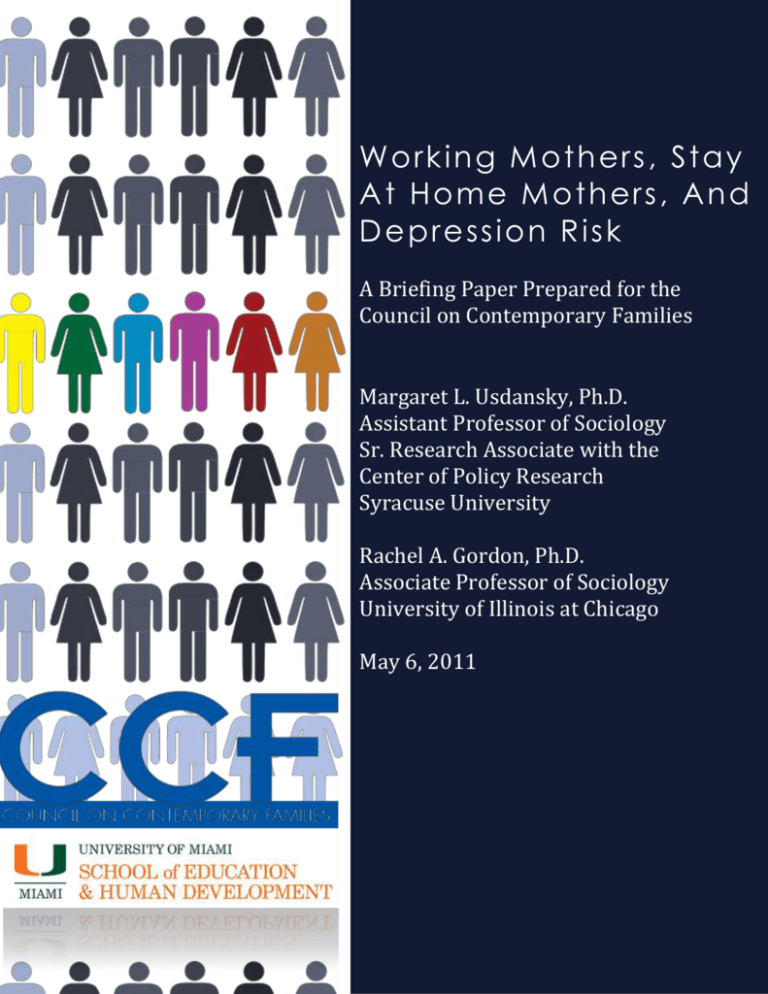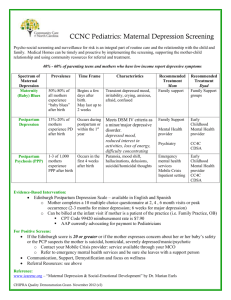Full Report as a Word Document
advertisement

Wo r k i ng M o t h e rs , S t a y A t H om e M o t h e rs , A n d D e p r e s si o n Ri s k A Briefing Paper Prepared for the Council on Contemporary Families Margaret L. Usdansky, Ph.D. Assistant Professor of Sociology Sr. Research Associate with the Center of Policy Research Syracuse University Rachel A. Gordon, Ph.D. Associate Professor of Sociology University of Illinois at Chicago May 6, 2011 WORKING MOTHERS, STAY AT HOME USDANSKY & GORDON 2 Working Mothers, Stay At Home Mothers, And Depression Risk Margaret L. Usdansky, Ph.D. Assistant Professor of Sociology Sr. Research Associate with the Center of Policy Research Syracuse University Rachel A. Gordon, Ph.D. Associate Professor of Sociology University of Illinois at Chicago Mothers of young children face difficult decisions when it comes to employment. Some feminists warn that staying home leads to social isolation, increasing the risk of maternal depression. But many neo-traditionalists counter that employment increases women's stress levels, leading to depression because of lost time with children or worries about child care. The question of whether working or staying home causes depression matters not just for the sake of mothers' happiness, but for the well-being of children, since maternal depression is a risk factor for children. So it is important to know the findings of a new study: When it comes to mothers' risk of depression, both these one-size-fits-all arguments miss the mark. The impact of working for pay or staying home on women's risk of depression depends on mothers' preferences and on their job quality, our study finds. Mothers who stay home because they prefer not to work outside the home have a relatively low risk of depression. But stay-at-home mothers who would rather be working for pay do face higher risks of depression. In fact, these women had the same risk of depression as mothers in our sample who wanted to stay home but had to go work in low-quality jobs. Employment isn't always "good" or "bad" for women's morale. Much depends on the quality of the job, and this can even trump women's preference. Mothers employed in lowquality jobs face a heightened risk of depression even when they do want to work for pay. But interestingly, mothers employed in high-quality jobs face a low risk of depression even if they do NOT want to work for pay. The Study Our study ("Depression Risk among Mothers of Young Children: The Role of Employment Preferences, Labor Force Status and Job Quality"), written with Xue Wang and Anna Gluzman (University of Illinois at Chicago), will be published in the Journal of Family and Economic Issues in 2012. It focuses on mothers with children from birth through age three who were interviewed as part of The Study of Early Child Care and Youth Development (SECCYD), conducted by the Eunice Shriver Kennedy National Institute of Child Health and Human Development's Early Child Care Research Network. WORKING MOTHERS, STAY AT HOME USDANSKY & GORDON 3 Findings High job quality is linked to lower depressive symptoms among mothers of infants and toddlers. Women in high-quality jobs report fewer depressive symptoms than women in lowquality jobs. This finding holds true not only for women who want to work for pay, but also for women who would prefer to stay at home. In fact, these women have as few depressive symptoms as Stay-at-Home Mothers who prefer to stay home. "Staying home" is associated with elevated depressive symptoms only among women who want a job. Women who do not have jobs and do not want them report few depressive symptoms. Their level of depression risk is comparable to women employed in highquality jobs. However, women who do not have jobs but want to work outside the home report elevated depressive symptoms. Their level of depression risk is comparable to women employed in low-quality jobs. (See chart and notes at end of report) In short, neither employment nor non-employment is best for all mothers with young children. Instead, mental health depends on mothers' employment preferences, and if they work for pay, their job quality. Implications This research is important because many other studies have found that depression is common among mothers of young children and has serious consequences for families. Children who live with depressed mothers are at risk for many behavioral, emotional, and social problems. The study is also important because it reveals the inaccuracies of arguments that all women should work for pay or that all women should stay at home. It's not as simple as these one-size-fits-all arguments suggest. The actual situation, desire, and job quality all matter. Although our study could not measure why women chose to work for pay or not, it is clearly important for mothers of young children to consider their own desires when deciding whether to seek a job. The study also has several broad policy implications. First, all mothers-even those who do not desire employment-may benefit from having a high-quality job. Second, job quality should be a central concern when creating policies that encourage maternal employment or require mothers to hold a job as a condition of welfare receipt. Third, it may be important to provide mental health support systems for mothers who are in low-quality jobs or who are unemployed but want to hold a job and therefore may be at risk of depression. WORKING MOTHERS, STAY AT HOME USDANSKY & GORDON 4 Mothers without jobs who prefer not working and mothers in high-quality jobs - regardless of employment preference - have equivalently low levels of depressive symptoms. Mothers without jobs who would prefer to be working and mothers in low-quality jobs - regardless of employment preference - have equivalently high levels of depressive symptoms. Measuring Depression Risk Risk of Depression was calculated using the Center for Epidemiological Studies Depression scale (CES-D), one of the most widely used measures of depression symptoms. Measuring Job Quality The Study of Early Child Care and Youth Development measured job quality by examining participants' responses to questions involving lack of advancement opportunities, lack of appreciation and respect, too much to do, lack of support and lower than deserved earnings, as well as the rewards of doing important work, being part of a team, being recognized for hard work, and feeling a sense of accomplishment. WORKING MOTHERS, STAY AT HOME USDANSKY & GORDON 5 About the Authors Margaret L. Usdansky Assistant Professor of Sociology Syracuse University Email: mlusdans@maxwell.syr.edu Rachel A. Gordon Associate Professor of Sociology University of Illinois at Chicago Institute of Government and Public Affairs (IGPA) Email: ragordon@uic.edu Xue Wang & Anna Gluzman Graduate students Department of Sociology University of Illinois at Chicago Media Contact Virginia Rutter Associate Professor of Sociology Framingham State University Board Member, Council on Contemporary Families Email: vrutter@gmail.com Phone: 206-375-4139 About CCF The Council on Contemporary Families is a non-profit, non-partisan organization dedicated to providing the press and public with the latest research and best-practice findings about American families. Our members include demographers, economists, family therapists, historians, political scientists, psychologists, social workers, sociologists, as well as other family social scientists and practitioners. Founded in 1996 and now based in the School of Education and Human Development at the University of Miami, the Council's mission is to enhance the national understanding of how and why contemporary families are changing, what needs and challenges they face, and how these needs can best be met. To fulfill that mission, the Council holds annual conferences, open to the public, and issues periodic briefing papers and fact sheets. Access our publications and learn more about CCF membership at www.contemporaryfamilies.org






